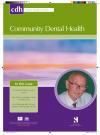Community Dental Health

- Cover Date:
- June 2013
- Print ISSN:
- 0265 539X
- Vol:
- 30
- Issue:
- 2
Automated coaching to help parents increase their children’s brushing frequency: an exploratory trial
doi:10.1922/CDH_3035Hurling06
Advances in digital communication, such as the internet, now provide a cost effective channel to reach and help families struggling to establish good oral hygiene in their homes. This paper describes a novel internet based oral hygiene intervention whose design draws from advances in social cognitive models of behaviour change. Intervention components included role-modelling cartoons for children, a guide for parents on using rewards, a personalised plan with clear steps, tips to follow and a weekly 10-minute review of progress. Objective: To evaluate the efficacy of the online coaching programme; specifically we expected that those in the intervention group would brush their teeth more frequently during the intervention period than those in the control group. Basic research design: An exploratory trial using a randomised controlled parallel approach. Participants: Children aged 5 to 9 years from 44 families (23 control and 21 intervention). Main outcome measure: An objective monitoring of tooth brushing. Results: In the 3-week intervention period, children from families assigned to the coaching programme brushed their teeth 38% more often than those in the control group. Conclusions: The programme was effective in a number of respects. Opportunities for further research are discussed, including the need to create a more engaging system and so increase compliance.
Key words: oral hygiene, internet, behavior, pilot projects, intervention studies, cellular phone, mobile phone
- Article Price
- £15.00
- Institution Article Price
- £
- Page Start
- 88
- Page End
- 93
- Authors
- R. Hurling, J-P. Claessen, J. Nicholson, F. Schäfer, C.C. Tomlin, C.F. Lowe
Articles from this issue
- Title
- Pg. Start
- Pg. End
- Barriers and facilitators that influence the delivery of prevention guidance in health service dental practice: A questionnaire study of practising dentists in southwest England
- 71
- 76
- Care home managers’ views of dental services for older people living in nursing and residential homes in inner city London
- 77
- 82
- Automated coaching to help parents increase their children’s brushing frequency: an exploratory trial
- 88
- 93
- Operationalisation of the construct of access to dental care: a position paper and proposed conceptual definitions
- 94
- 101
- Sociodemographic differences in oral health-related quality of life related to dental caries in Thai school children
- 112
- 118
- Short Communication - The cross cultural adaptation and validity of the Child-OIDP scale among school children in Karnataka, South India
- 124
- 126
- Short Communication - Defluoridation techniques implemented by the government of Karnataka, India – the current situation
- 127
- 128
